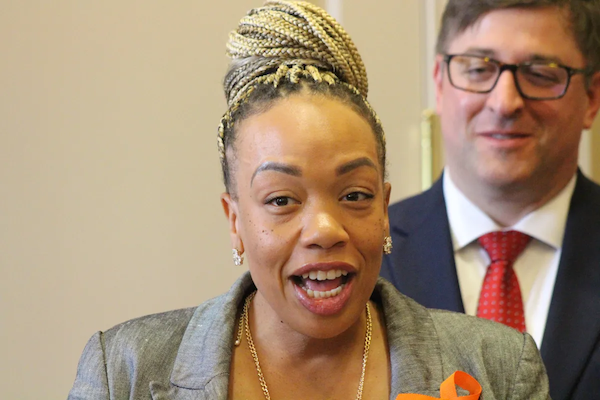Several measures fail to make agenda

Now, it appears that only three of the 13 pieces of legislation that had been introduced for the session will be considered during Tuesday’s proceedings.
An agenda posted late on Friday for the Delaware House of Representatives includes none of the legislation that is primarily sponsored by Republicans or by progressive Democrats supported by the Delaware Working Families Party.
Instead, the agenda shows three bills that appear relatively popular across the political spectrum, and that House Speaker Melissa Minor-Brown last week said would be her focus for the special session. In all, it is a truncated list that highlights the strict control of the legislative process that has been a hallmark of Democratic leadership for years.
 Rep. Madinah Wilson-Anton speaks about property tax reform at a press conference in Wilmington in August, 2025. | SPOTLIGHT DELAWARE PHOTO BY ETHAN GRANDIN
Rep. Madinah Wilson-Anton speaks about property tax reform at a press conference in Wilmington in August, 2025. | SPOTLIGHT DELAWARE PHOTO BY ETHAN GRANDINIt also comes despite recent overtures to the public made by legislators on the political left and right who sought to convince colleagues that their bills were worth considering during the special session.
Last week, Rep. Mike Smith, (R-Newark) declared that opposing his bill — which would strip school districts of their ability to raise tax revenues following a property reassessment without a referendum — would amount to political malpractice for his Democratic colleagues.
“I’m getting a ton of phone calls, a ton of emails, messages, text messages, every single day,” Smith said. “People are clearly hurting or clearly upset.”
Asked at the time if she expected House leadership to consider their legislation, Wilson-Anton indicated that she and her allies may have more leverage during the special session than is typical during a regular session.
She noted that any piece of legislation – including those favored by leadership – must get buy-in from a majority of the chamber just to be considered during the proceedings because special sessions bypass mandatory committee hearings.
“For us to consider any legislation … we would have to suspend rules in the House. And so anything is possible,” Wilson-Anton said.
Raise taxes on business to lower it for homes?
Among the three bills included within the House agenda is the most-talked-about of all measures put forth recently – and the most widely supported by Democrats and Republicans.
House Bill 242, sponsored by Rep. Kim Williams (D-Stanton), would allow school districts in New Castle County to charge higher property tax rates on commercially owned land, in order to subsequently lower the rates on residential properties.
 Rep. Kim Williams (D-Stanton), the chair of the Joint Finance Committee, is leading the most popular bill on the docket. I SPOTLIGHT DELAWARE PHOTO BY JACOB OWENS
Rep. Kim Williams (D-Stanton), the chair of the Joint Finance Committee, is leading the most popular bill on the docket. I SPOTLIGHT DELAWARE PHOTO BY JACOB OWENSThat bill seeks to assuage homeowners who are angry after the recent property reassessment shifted tax burdens in New Castle County away from businesses to residents.
Democrats and Republicans alike have criticized the county’s reassessment process as one that they said placed vulnerable, low-income homeowners – particularly retirees – into dire financial straits.
The reassessment came as part of a statewide initiative to revalue land that had not been reassessed in decades. It also was a direct result of a 2018 lawsuit brought by the NAACP and other plaintiffs who argued that the failure to update property values had created inequities among schools, because districts depend on property taxes to fund the operations.
Ultimately, the Delaware Court of Chancery case settled, resulting in New Castle, Kent and Sussex counties each agreeing to complete their first reassessments since at least 1983.
The counties’ separately awarded their contracts to carry out the arduous reassessment process to Plano, Texas-based Tyler Technologies. And the assessor was instructed to calculate a “fair market value” for residential homes. Among several factors the company examined were lot sizes, numbers of bedrooms and bathrooms, and the age of a home and its building style.
Despite the seemingly agnostic approach, the property valuations that resulted – particularly in New Castle County – drew widespread criticism. Before the reassessment, residential properties made up about 66% of the county’s tax burden. Afterward, they represented 76%
Leading much of the critiques was Wilmington City Councilwoman Christian Willauer, who recently compiled a report showing several questionable individual property reassessments.
Willauer also attended Wilson-Anton’s press conference on Friday, where she publicly called for an audit of the reassessment process.
“It’s not fair for billionaire corporations like Amazon to get big tax cuts and ask regular people for more,” she said.
In a press release on Thursday, Minor-Brown offered a more moderate critique of Tyler Technologies, but still stated that the reassessment “caused serious and unexpected financial strains for many Delawareans.”
‘Middle ground’?
Before the House agenda was made public on Friday, Minor-Brown said in an interview with Spotlight Delaware that she hadn’t yet decided whether to include bills from her political left or political right to the list of legislation to be considered during the special session.
Still, she did stress that her focus was on the three bills that ultimately ended up on the agenda. Aside from HB 242, those include bills to require counties to refund homeowners who have paid too much property tax, and to allow school portions of the property taxes to be paid in installments.
Minor Brown said the bills amounted to “immediate relief” to homeowners, while adding “there’s still a lot of work that needs to be done.”
When asked about a Republican measure to remove school districts’ ability to unilaterally raise taxes up to 10% following property reassessment, Minor-Brown said, “I don’t really know where I stand on that bill at the moment,” while noting her desire to find a “middle ground.”
“It definitely deserves a conversation,” she said. “But I also want to make sure that we’re not, once again, doing more harm than good.”
After the reassessment came to a close earlier this year in New Castle and Sussex counties, several school districts — including Christina, Appoquinimink, and Indian River — chose to increase their tax revenues by the full 10% that the law allows after a reassessment comes to a close. A handful of other districts increased their property tax revenues by smaller chunks.
When asked about bills from the left flank of her party, Minor Brown said Friday that she hadn’t yet seen them, and asserted that they had “just showed up” without being circulated among Democrats.
“I got quite a few phone calls (from lawmakers) because folks were like, ‘What are these bills? We haven’t even heard of them,’” she said. “So I haven’t even looked at them yet, to be completely honest with you.”
For her part, Wilson-Anton said her progressive group of Democrats did not have sufficient time to circulate bills with colleagues because they were never told about the special session from leadership. She said she learned about it only when Williams, the Stanton Democrat, posted an announcement about it publicly on Facebook.
Wilson-Anton said she supports the special session, but added that the process would have been better “if we had meetings earlier, saying, ‘We’re going to go back. What are you hearing?”
“But we didn’t have a conversation,” she said of her interactions with leadership. “It was a directive.”














(0) comments
Welcome to the discussion.
Log In
Keep it Clean. Please avoid obscene, vulgar, lewd, racist or sexually-oriented language.
PLEASE TURN OFF YOUR CAPS LOCK.
Don't Threaten. Threats of harming another person will not be tolerated.
Be Truthful. Don't knowingly lie about anyone or anything.
Be Nice. No racism, sexism or any sort of -ism that is degrading to another person.
Be Proactive. Use the 'Report' link on each comment to let us know of abusive posts.
Share with Us. We'd love to hear eyewitness accounts, the history behind an article.